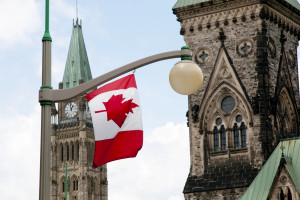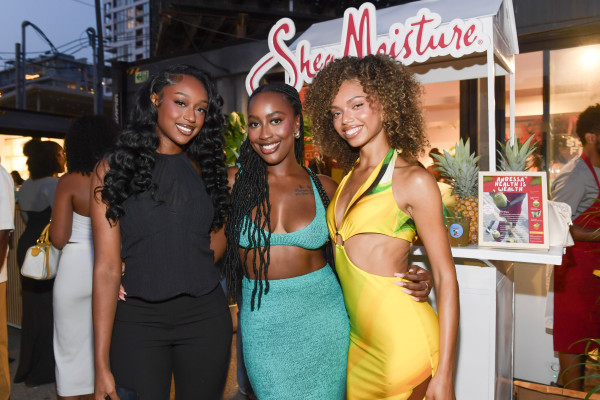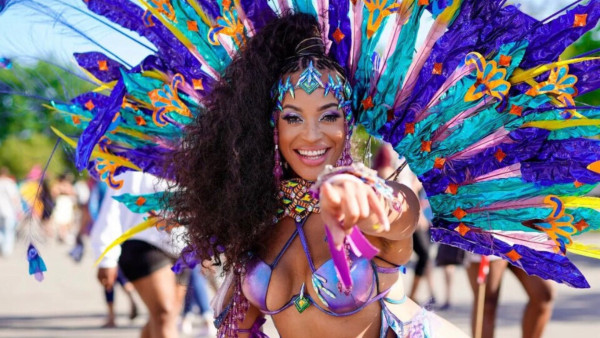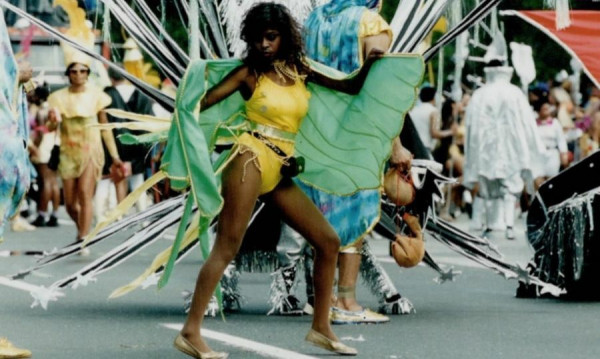It’s a celebration that embodies our lineage and evokes feelings of resistance, freedom, and pride. It also provides masqueraders with a closer connection to their cultural roots.
But this year, participation drastically declined. We reached out to the leaders of the five major bands in the city, and two leaders said they’ve seen a 40% decrease in registration compared to 2023, while a third band leader reported a 53% drop, marking an unprecedented decline.
Why are so many people calling it quits on the biggest Caribbean cultural festival in North America?
Long-time masquerader Jahlyssa W., who is of Trinbagonian and Barbadian descent says, “I love playing mas because it makes me feel alive and more connected to West Indian culture while living in Toronto.”
Despite the shifting economy, Jahlyssa has continued to participate in the Toronto Caribbean Carnival saying that she ‘feels lost’ if she’s in the city and doesn’t play mas. “I still love the excitement, despite how expensive mas keeps getting.”
But while Jahlyssa has been a die-hard Carnival chaser, she says this year was her last.
“I didn’t have much of an experience playing mas this year,” she tells us. Taking to social media to air her grievances, Jahlyssa received a costume in the wrong size.
After spending hours at the Mas Camp, she was told that the outstanding piece would be delivered to her home, mere hours before the Grand Parade. But it never arrived.
Others were put off by the growing price tag of the Toronto Caribbean Carnival, a growing trend over the last couple of years that we’ve seen more people speaking up about it.
{https://x.com/mamateeks/status/1518650560018366474?s=46&t=FJHIVuQCj59fvenZawpTUQ}
A self-described “reformed stormer”, Tanya Hayles, founder of Black Moms Connection in Toronto, recounts her first time playing mas in 2015 as one of the most freeing, beautiful, and inclusive experiences she’s ever had. “It made me see my body very differently, and from that point on, I was like, ‘Yes, this is a thing.’”
Hayles says the cost of her costume was no more than $300, even with an additional headpiece upgrade. “At the time, based on the money I was making, three hundred dollars was reasonable, especially as a first-timer.”
Hayles has played mas in Toronto almost every year since then. But says the costs now are unreasonable.
{https://x.com/goldengails/status/1784099695419089355?s=46&t=FJHIVuQCj59fvenZawpTUQ}
The prices of costumes vary depending on which band masqueraders choose to play with. If they decide to purchase online, additional processing fees can be upwards of $50 per transaction. Each band may offer basic road amenities including local and international DJ’s, music trucks, food, and cold beverages. With the purchase of ‘pricier’ costumes, some section leaders may offer cool-down trucks, makeup touch-up stations, and exclusive goodie bags solely designated for those masqueraders.
When looking at the costume costs of five Carnival bands in Toronto for the 2024 season, including Tribal Carnival, Toronto Revellers, Saldenah Carnival, Carnival Nationz, and Sunlime Mas, the average prices of costumes were relatively similar. Backline costumes had an average price of around $390, midline costumes were around $650, and frontline costumes were over $1200 (with feathered backpacks).
In their' Mosaic' section, Tribal Carnival offered scaled-down options in the $200 range for masqueraders, with a $275 bodysuit and a $250 bucket hat and shorts combo. Across each section, Sunlime Mas provided male masqueraders with backline options for $320, the most ‘affordable’ option amongst the bands listed. Both Tribal Carnival and Saldenah Carnival had higher-end options across multiple sections, from backline to ultra frontline.
Despite the revelry and camaraderie experienced during the parade, Hayles doesn’t think the experience in Toronto is worth it. She says apart from rising costume prices, inadequate hydration stations, food and customer service was a brimming issue. “For me, I can spend the same amount of money and leave the country for a weekend. So I'm always doing a return on investment in comparison,” she says. Experiencing two international Carnivals, Hayles would rather save for her next big Carnival in the Caribbean, instead of returning to the Lakeshore.
Echoing Hayles’ concerns, Courtney Allen says the Toronto Caribbean Carnival has been an active part of her childhood, in which she affectionately includes her ‘origin story.’ Sharing that her parents met at the parade, Allen, who is of Jamaican and Trinidadian descent, made her road debut in 2017 with Saldenah Carnival in a $300 costume.
“I was so excited. It kind of felt almost like a rite of passage.”
Allen outlined three reasons she quit the Toronto Caribbean Carnival after playing mas for the last time in 2022. “One, it’s definitely the costume prices, I feel like it’s getting to be a little bit excessive.”
Secondly, Allen feels like the pricing strategy contradicts what she knows to be true about Carnival. “[It] has inclusive origins, and I feel like it’s historically been aimed to involve all aspects of community regardless of someone’s economic status. I feel like we’ve lost that piece even more. It’s heartbreaking to learn that a lot of section leaders are outsourcing to places like China,” she says. “I assume it’s offsetting their costs; however, I don’t see that reflected in the prices we would have to pay as a participant.”
Lastly, Allen raises concerns about the safety on the road in Toronto due to the disturbance by stormers. “I played in Trinidad for the first time this year. I was in awe to see the marshals escorting stormers out of the parade. I've never experienced that in Toronto.”
{https://x.com/beequammie/status/1820102523849527646?s=46&t=FJHIVuQCj59fvenZawpTUQ}
‘Stormers’ are people who have not paid for a costume but join the parade, often intentionally damaging costumes and violating the personal space of costumed masqueraders. “I did notice a smaller amount of masqueraders on the road, and this did leave room for more stormers than usual,” says Jahlyssa.
{https://x.com/beequammie/status/1819806946691871009}
Mischka Crichton, CEO of The Festival Management Committee, which runs the parade, told ByBlacks via email, “We have significantly increased the number of security staff deployed along the parade route and at key entry points to monitor and manage the flow of participants and spectators.” Crichton says they’ve also launched public education campaigns to educate the public about how to participate. “Through social media, community outreach, and public service announcements, we emphasize the importance of respecting the event and its cultural significance.”
{https://www.instagram.com/p/C-NCHStsfbO/}
POV: Sunlime Mas Bandleader
Committed to providing a high-quality experience for masqueraders, Dwayne Gunness, bandleader of Sunlime Mas, has been an active member in the Toronto Carnival scene for over three decades. Sunlime Mas came on the scene in the year 2000 and is marketed as the No. 1 medium-sized band on their website. Gunness attributes the decline in registrations to rising costs of the economy, and masqueraders finding value elsewhere.
Nevertheless, Gunness says he stays focused on customer service and maintaining a good reputation. “I think it’s the way we service and treat people,” he says. “You haven’t heard any complaints about us. We’ve never been on Follow Soca or any other thing. I’m not saying there hasn’t been any issues, but we’ve dealt with it appropriately and met the satisfaction of the complainants.”
Passionately speaking about the quality he provides new and returning masqueraders, Gunness mentions the importance of quality control. “With us, what you see is what you get. It goes back to the rule in our Mas camp. You take what you can handle,” he says. “I tell the section leaders, if you can make seventy [costumes], then seventy is what you can handle. So don’t make extras when it’s going to be falling apart. We don’t want complaints that it’s not going to fit properly, which is why I always preach about the customer service part.”
Thankful for being off the radar of negativity from masqueraders in Toronto, Gunness gets real about the mounting costs of production and how he’s seen prices increase since the pandemic. “COVID definitely impacted everything. A few years ago, these materials were maybe five dollars per piece. Today, I’m paying ten,” he says. Gunness notes that the price of these materials are in American dollars.
In spite of rising costs, Sunlime Mas offered a ‘college level’ costume option for Gen-Z masqueraders interested in playing mas at an affordable price. “So it’s not your full costume but it’s enough where you can be seen.” The option was available in six different sections for just $290.
“Toronto Carnival is a one-day event, and people during these tough economic times, if they do choose to do Carnival, they are saving their money and spending it in areas that have multiple events attached,” Gunness says. “For instance, when we’re finished here, we’re off to Miami. In Miami, yes, you pay your money to play mas, but you get j’ouvert the day before. In Trinidad, you get way more than Toronto,” says Gunness.
Carnival band leaders like Gunness are in a tough financial spot. Gunness says that Sunlime Mas receives $20,000 in funding from the Festival Management Committee, but his rent at the Mas camp is $24,800. “So we’re starting off on the back end,” he says.
Crichton says Toronto Caribbean Carnival is the only Caribbean Carnival that provides financial support to Mas Bands. “The FMC also provides infrastructure and logistical support, such as securing venues, organizing events, and ensuring smooth operations during the Carnival. This support helps alleviate some of the financial burdens on band leaders, enabling them to focus on delivering an exceptional carnival experience.”
Crichton acknowledges the feedback from past participants about the perceived lack of value for money. She says the root of the problem is the rising costs of materials and lack of funding all around. “Despite the significant economic impact of the carnival, funding from various levels of government and private sponsors has not kept pace with rising costs. This financial shortfall affects the overall quality and affordability of the event, leading to a decline in participation,” says Chrichton.
{https://x.com/impatientourist/status/1820257007892418797?s=12}
With feedback and solutions in mind, Jahlyssa says there are a variety of things that would encourage repeat masqueraders, including lower costs, loyalty programs, and security on the road. She points out the need for better food trucks, and more modern and creative costume designs.
At its core, preservation of the culture remained a focal point for both Hayles and Allen. Despite opting out of the parade this year, Hayles supports other aspects of the Toronto Caribbean Carnival such as Friday Night Mas, ‘a night festival bringing Carnival into the light'. This event offers packages for as low as $135, and is a good alternative for masqueraders who don't want to join the main parade. Allen also encourages people to engage with other parts of the Carnival, including watching the Kings and Queen Showcase, or Toronto Panorama.
Allen wishes that bands offered more transparency and value to its masqueraders, without losing sight of the main message of Carnival. “If I'm thinking of the big picture, I do think that we need to remember that mas and carnival are meant to be inclusive for everyone.”
She gets emotional towards the end of our call saying, “I feel like it is my duty to engage. Engaging in these events [outside of participating in the parade], and attending them is a big deal. It helps me keep that connection to my culture, especially since I wasn’t born on an island. I just want to keep staying connected.”

 By
By 





